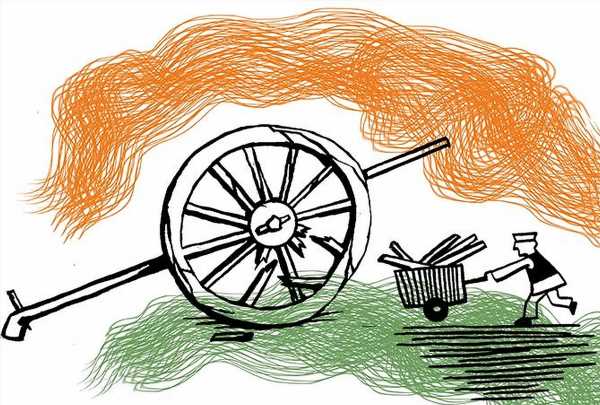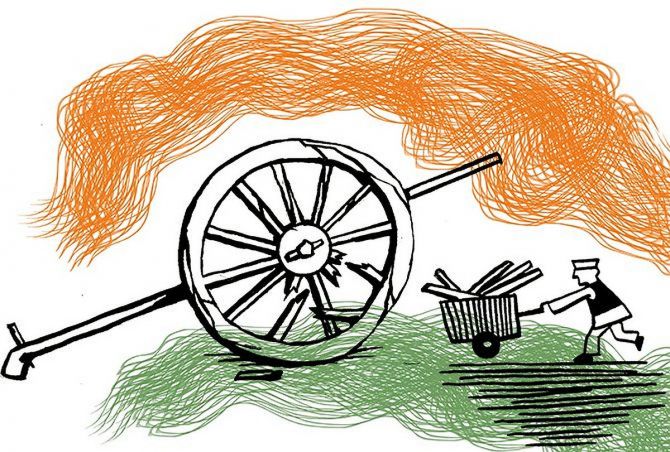Fiscal pressure for the Indian economy is gradually rising, suggested analysts at Jefferies in a recent note, as oil prices (Brent) — which are close to the $100 a barrel mark — continue to climb ahead of a busy election calendar.
They added that the sharp rally in the equity markets during the last few months has made valuations costly.
As a result, Jefferies expects the Indian markets to remain choppy in the near term.
“Nifty above 20,000 with one-year forward price-earnings (PE) of 19.3x at +1 standard deviation and 12 per cent above 10-year average; our preferred yield-gap parameter (10-year bond yields less 1/Nifty PE), at 200 basis points (bps) is + 58 bps since March lows and +69 bps above average, pointing towards valuation discomfort,” wrote Mahesh Nandurkar, managing director (MD) at Jefferies, in co-authored note with Abhinav Sinha and Nishant Poddar.
As a stock strategy, they have shifted consumer staples to underweight, and moved weight (bought into) to Bharti Airtel in their model portfolio.
“We would buy the dips, as the medium term appears bright with the ongoing capital expenditure (capex) cycle recovery,” Nandurkar said.
Surging oil prices
Rising oil prices, coupled with a busy election calendar in the months ahead, may exert pressure on the fiscal situation, said the Jefferies note. From around $83 a barrel on August 21, oil prices have surged nearly 14.5 per cent as Russia and Saudi Arabia cut production.
“With Brent crude oil price above $90 a barrel, the headroom for a fuel price cut around Diwali (Q4 of CY23) is gone.
“The reverse may happen, though with diesel prices, implying losses for public sector oil companies.
“Rising oil prices have adverse implications for the rupee as well, with every $10 a barrel swing implying a 0.4 percentage point (ppt) change in the current account deficit (CAD),” Nandurkar wrote.
The political schedule will be a busy one during the next few months as five states — Madhya Pradesh (MP), Rajasthan, Chhattisgarh, Telangana and Manipur — go to polls.
These polls, experts suggest, will be an indicator of BJP’s performance in the general elections, scheduled for 2024.
In 2018, the BJP lost power in the three states of MP, Rajasthan and Chhattisgarh to the Congress. Jefferies said the busy election calendar is likely to exert pressure on the government for increasing social spending.
The spending may include schemes to boost annual transfers to farmers, expanding health insurance and interest subsidy on home loans.
State freebies, they said, have already started in a big way. Nandurkar believes that a sharp rally in public sector undertaking (PSU) stocks may prompt the government to push for divestment in some companies.
“Senior ministers and bureaucrats suggest that the Bharatiya Janata Party (BJP) government is likely to build on the G20 momentum, with this week’s new Parliament inauguration being a part of the mega projects completed under the Modi-2 government.
We also sense that up-fronting the national election to December 2023 (currently scheduled for April 2024) is unlikely, partly because of the weather (winter in hill states) and partly because of the Ram Temple opening on January 24,” Nandurkar said.
A Jefferies note suggested in August that markets feel Prime Minister Narendra Modi has a 70 per cent chance of returning to power.
From a long-term perspective, such a scenario bodes well for property and capex-related plays, including cement, infrastructure, capital goods, large banks, small and mid caps, it said.
Source: Read Full Article
-
Letterboxd, A Big Booster Of Indie Films, Is Acquired By Canadian Investment Firm Tiny
-
Issa Rae’s Hoorae Names Raj Raghavan Head Of Talent Division At ColorCreative
-
Chuck Todd To Step Down As ‘Meet The Press’ Moderator, Kristen Welker To Succeed Him
-
Henkel FY22 Profit Down, Sees Slower Organic Sales Growth In FY23; Stock Down
-
Russia Lowers Key Rate By 50 Bps


